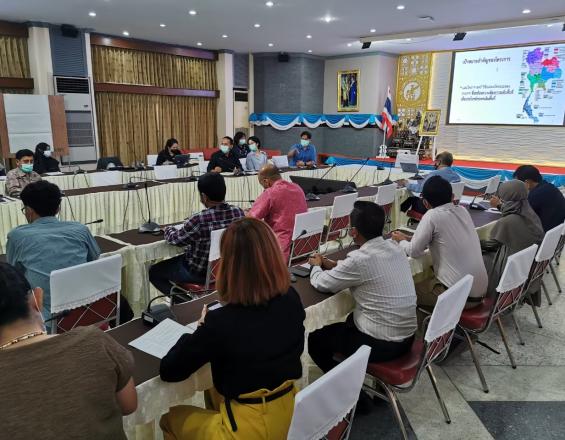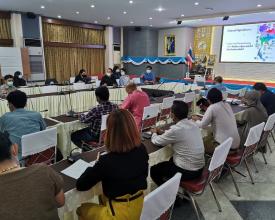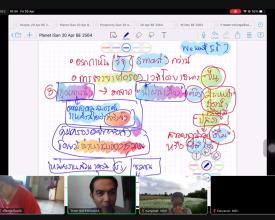Localizing SDGs in Thailand: Towards a More Inclusive National Science, Research, and Innovation (SRI) Plan

In 2020, the Thailand Science, Research and Innovation Committee (TSRI), a research policy and funding organization, was tasked with drafting an inclusive National Science, Research and Innovation (SRI) Plan to direct the allocation of national research funding in the period 2023 – 2027. Besides steering Thailand towards a sustainable path, TSRI worked on catering to diverse stakeholders and communities across the country, leaving no one behind.
A sustainable and localized research policy could lead to research funding to be allocated in a more balanced way, addressing not only economic but also social and environmental issues that would benefit local people and support sustainable solutions at a local level through research.
In this project, SDG Move developed a method using the SDGs as framework and foresight techniques as a basis for an evidence-based and participatory process to investigate local needs in Thailand’s regions, working with TSRI and regional teams of local researchers.
Context
Challenges addressed
Throughout the project, the researchers focus on several challenges. The two most pressing obstacles are the project time frame and the impacts of the COVID-19 pandemic. While there were more than 500 respondents, the researchers were hoping to conduct more rounds of questionnaires and engage with more respondents while employing the Delphi Method. Additionally, the researchers from various institutions across the country were hoping to hold face-to-face workshops to discuss results. Unfortunately, due to time limitations imposed by the government organization, the researchers could not communicate with more stakeholders. Additionally, the lock-down policies in many provinces across the country meant that organizing workshops were impossible. Participants who could not access online technology, such as some elderly and people with disabilities, had to be excluded from the study.
Location
Process
Summary of the process
There are three main building blocks in this project, namely, (1) TSRI’s more inclusive direction in the SRI strategic plan’s drafting process as well as its pool of experienced local researchers, (2) our 6 regional teams of researchers from local universities, (3) SDG Move’s expertise in SDGs and social capital with the regional teams and TSRI, and (4) evidenced-based and participatory foresight techniques.
TSRI’s more inclusive direction in SRI strategic plan’s drafting process provided a great opportunity for SDG Move to localize and to integrate SDGs into the SRI strategic plan. TSRI also has a pool of experienced local researchers all over Thailand, which was a source of our 6 regional teams. The regional teams were key to collecting relevant data and engaging with local stakeholders from all sectors, which was crucial since the data environment and infrastructure at the regional level is not well-functioning.
SDG Move had been working with TSRI since 2016 on SDGs and developed a strong partnership. With our expertise in SDGs, we developed an SDG-integrated and foresight-based research process and mobilized the whole project with TSRI and the 6 regional teams.
Building Blocks
Engagement of local researchers
Local researchers are the most important actors in the implementation of this project.
The project involved experienced researchers and professors based in 8 universities which were organized in 6 regional teams in the North, Northeast, Central, East, South, and Deep South.
Although they come from various disciplines, most of their research interests are focused on development, at the local, provincial, and regional levels. They have insights on local problems, social capital and close connections with different stakeholders in the region. They came into this project with expertise covering some issues within the localization and implementation of the SDGs, and curiosity to learn more and utilize the Global Goals for promoting their local agenda.
Enabling factors
1. A clear contract and financial support. TSRI financed the project to SDG Move. SDG Move did a contract with the regional team and allocated the financial resource to them based on the number of provinces they have to cover.
2. A clear objective and action plan, which was drawn, executed, and coordinated by SDG Move.
3. Online conferencing and shared online questionnaires on the paid platforms were provided to the regional teams.
Lesson learned
The involvement of local researchers ensured that essential stakeholders and people were included in the study and that culturally appropriate methods and resources were employed. In areas of conflict, such as the Deep South, established social capital between local researchers and local stakeholders were crucial. Local perspectives were key in interpreting research findings and considering the local context in which data was collected.
COVID-19 and related measures were the main obstacles in the implementation of the consultation process. Nevertheless, local researchers and stakeholders quickly adjusted to the pandemic situation and participated in online consultation processes. After the first period of adjustment, the online consultation process became more inclusive since stakeholders from anywhere can participate at a relatively low cost. However, with this method, some stakeholders were excluded from the process due to the lack of digital literacy, infrastructure, and resources.
Foresight research techniques
Three foresight techniques were employed: (1) horizon scanning, (2) the Delphi Method, and (3) Backcasting.
Horizon scanning is a technique used for researching signals of change in the present and their potential future impacts. This ensured a comprehensive overview of the existing development issues, and narrow them down to a set of potentially challenging ones. Data collected in this process include secondary data related to SDG targets, headlines of newspapers in the past 3 years, social media trends in the past year, and insights into the local situations by local NGOs and CSOs.
The Delphi method was employed to narrow down and prioritize the potential challenges and issues. This method was used for the design of the consultation process in which each expert has the least non-academic influence on each other. This project had two rounds of questionnaires. The first round was to cross-check the data from horizon scanning by the experts. The second round was for prioritizing identified challenging development issues.
The prioritized ones were selected as topics for the regional foresight workshop in which Backcasting was employed. It was used to design a participatory process in which stakeholders formulated their aspirations and proposed strategic directions to achieve the future.
Enabling factors
Before the COVID-19, the regional teams prefer face-to-face interactions and consultations. The foresight techniques were included only in the regional foresight workshop. However, with the COVID-19, we need a solution for the whole project.
All the foresight techniques were adaptable because of the availability of online conferencing platforms and online survey platforms. As the team consisted mostly of younger researchers, learning new online tools was not a problem. TSRI also played a role as technician assistance for the regional teams.
Lesson learned
SDGs contain too many topics for the Delphi Method, making the participating experts very exhausted when responding to several rounds of questionnaires. Moreover, almost no one knows all topics under SDGs enough to prioritize them with good judgement. In the end, we allowed the experts to only respond to the area(s) of their expertise.
Google Form does not work especially for a long-form that people take 4-5 hours to finish. We then shifted to Survey Monkey, which is more convenient once you understand the system. However, the learning curve is high. So we decided that SDG Move should take care of turning the questionnaire online and preliminarily processing the results for the regional teams.
Prioritized challenging SDG regional issues tend to interlink with each other.
An online consultation process is more efficient when there are no more than 10 people in a group. In a group, a facilitator and at least one note taker are needed. A facilitator increases the efficiency of the consultation. A meeting for preparation is needed before the event. Templates for note-taking should be provided.
Data Collection
Several types of data were collected throughout the process of this project. In the Horizon Scanning phase, socio-economic-environmental secondary data using SDGs as a framework were collected along with data from social media trends. This phase was mostly done by SDG Move. These data were processed and challenging social, economic and environmental issues were selected and made each of them into a 1-page report. Each region contextualized the 1-page reports and selected or added regional specific issues. In the Delphi method phase (regional level), expert opinions (assessing and commenting on the 1-page report in the first round and prioritizing the challenging issues in the second round) were collected and processed to identify regional priorities. The priorities were then utilized in the regional foresight workshops, in which Backcasting method was used in a multi-stakeholder consultation for obtaining the regional aspirations involving the regional priorities and strategic directions to achieve those aspirations. Outcomes of all regional processes were synthesized. A list of more than 10,000 research projects was analyzed against SDGs and the synthesized regional outcomes to obtain research gaps.
Enabling factors
The expertise of the regional teams made the contextualization of challenging issues possible with little effort. Their social capital, with personal connections to stakeholders from several sectors in the region, helped identify the stakeholders with experienced and engagement with the existing movements, enabling us to obtain grounded and current perspectives of these challenging issues.
A well-planned data collection process and regular and open consultation between SDG Move and the regional teams were also crucial for in-time data collection.
Lesson learned
Academic and Civil Society Organization experts are the second-based source to fill the data gap. This is possible because the data are not used for complex statistical methods but to understand the situation of the challenging issues. So the quantitative data was only one piece of the puzzle.
Clear objectives, timeline, and deliverables for each regional team help their planning. The timeline should account for delays and unexpected regional or local limitations. Regular check-in was important to update the project status and obstacles. The earlier the obstacles are identified, the better.
SDG Move as a coordination team has to be open-minded and listen to the voice and concerns of the regional teams since our plan is not perfect and might not fit regional and cultural contexts. The morale of the regional teams also needs to be observed and boosted when needed. The project progress and prospects, and a compliment from the TSRI office were good morale boosts.
Moving to the next stage
This building block is still ongoing. There are two complementary directions: (1) to the SRI policy, and (2) to the regional and local stakeholders. Regarding the SRI policy direction, the project outcome is now integrated into a pool of input to design the SRI plan as it was presented to the TSRI team, and the documents were submitted. The main challenge is to what extent our findings are utilized in the national SRI policy. Regarding the regional and local stakeholder direction, our team (SDG Move and the regional teams) is exploring the possibility of establishing a regional network for SDGs, based on the participants and the outcome of the regional foresight workshops. The regional teams are encouraged to use the regional outcomes of the project to engage with local policymakers and stakeholders to form a network to address the regional priorities on the ground.
Enabling factors
Designing the project with the knowledge user, in this case, the TSRI is crucial for moving to the next stage. When the project was designed together, the project outcomes are usable and used by the policymakers.
OK
The fact that the SDGs is a global agenda to which the government officially commits and is an obligation for both national and regional government agencies to address, making it easier for our regional teams to push forward the regional and local stakeholder direction.
Lesson learned
A reason that TSRI is interested in integrating localized SDGs issues into the SRI plan was because of their awareness of the SDGs’ importance and of the localized policies. However, not all government agencies are aware of these issues. Regular knowledge communication and engagement with the policymakers and government agencies would help them realize the importance of the SDGs. Creating a platform in which the policymakers and government agencies interact regularly with local stakeholders and their practices would also increase awareness.
Academia is in a great position to bridge the government agencies and CSOs using evidence-based and participatory approaches. The approach would provide some credibility and legitimacy to academia as a bridging sector.
A political process to negotiate what works for whom and to find a solution that all parties get some of their priorities is expected. This process even presented itself in our project. Each regional team also has their own local agenda. We need to find a way to balance the project objectives and their agenda so that everyone wins.
Impacts
The project allowed for the creation of a comprehensive database including information on development issues, including environmental ones, from each region of Thailand. The Thailand Science Research and Innovation (TSRI) will use this information to draft the national-level Science, Research and Innovation (SRI) Plan that encourages and supports researchers in addressing different regions' development needs. Other relevant organizations from every sector can access and use this information to formulate policies or activities that promote more development actions that address local issues.
Beneficiaries
Government agencies, Local Communities, Researcher / Academia, General Public.

